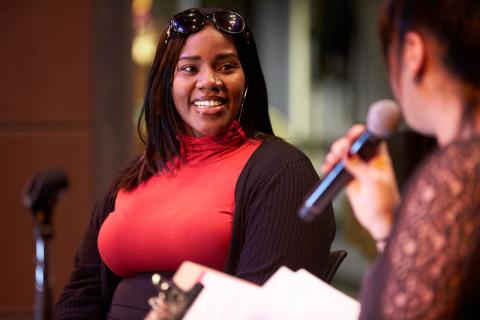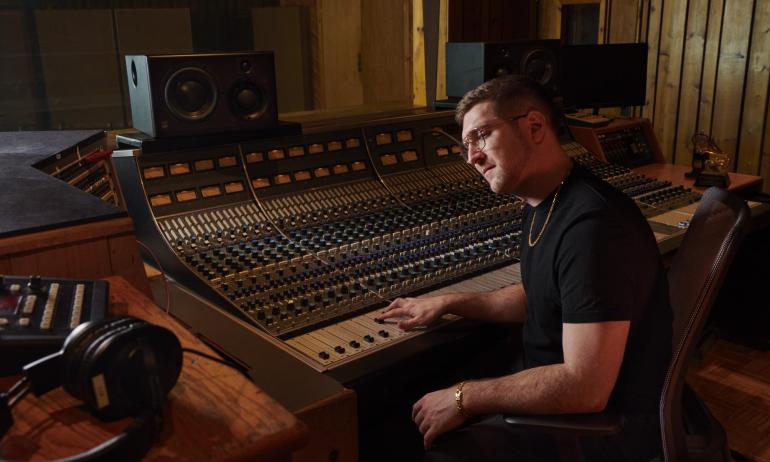Recording Artist Kelly Price Shares Personal Journey of Triumph with Students

Double-platinum recording artist Kelly Price shares her life and music journey with students during a visiting artist clinic, called Kelly Price: This Is Who I Am.
Kelly Davidson

"For every type of beauty, there is someone attracted to it," Price explained. "Beauty really is in the eye of the beholder, which was a big factor for me understanding that there are so many people out there that look like me."
Kelly Davidson
To overcome means to conquer and prevail over opposition. It requires courage, perseverance, and a victory on the other side that is worth the fight. For seven-time Grammy-nominated artist Kelly Price, overcoming runs through her veins. Price is a double-platinum R&B and gospel recording artist, songwriter, producer, actress, and author who has challenged music industry standards regarding body image throughout her career, breaking out of boxes and forging new paths for performers of all body types to be heard.
On November 15, Berklee hosted a visiting artist Reach Out Initiative clinic with Price at David Friend Recital Hall titled Kelly Price: This Is Who I Am. During the clinic, moderated by Leah Driscoll '03, assistant director of Health Promotion, Price shared her personal journey of self-acceptance, healing, and triumph, encouraging and empowering others to confront image stereotypes in the music industry.
Early Musical Beginnings
Price was born into a family of singers and preachers. She was a part of her church choir at a young age and began singing vocals on recording projects in her teenage years. These experiences led to her first big gig: performing live behind George Michael at Madison Square Garden in New York City, which opened the door to joining the choir that backed Mariah Carey at the 1992 Grammy Awards.
“We were in rehearsal this particular day and Mariah was running late," Price recalled. "They had a break to eat, but I had morning sickness so I stayed back with my sister and my friend and began to sing around the piano. While I was singing, Mariah walked by and heard me. By the end of the day, I was approached by Tommy Mottola, which was then the president of Sony Music International, and I was offered a gig.”
The gig was singing backup vocals for Mariah Carey on MTV Unplugged. This exposure spiraled into a plethora of other opportunities to sing backup for other artists, which began to spark conversations of Price starting her own solo artist career. However, the image stereotypes of the industry at that time posed discouraging roadblocks.
“People would hear me and they absolutely loved what they heard, but it was always followed up with, ‘Did you get a look at her? Did you see what she looked like? How do you market that?’ I was a ‘that,’ I wasn’t even a person,” Price explained. “So any dream or any hope that I had thought about being an artist, I quickly learned how to kill because I knew where the conversation was going to end.”
Instead, Price built a successful career for herself writing, producing, and vocal coaching, but inevitably, her desire to sing rose to the surface despite the discouraging voices that surrounded her.
“I knew that I was born to sing, and when that’s who you are, you can’t quiet that down. You can convince yourself to be quiet for a few minutes, but after a while, you’re going to get loud again,” Price said.
Journey into Greatness
Price continued to work successfully as a writer until her next big break came: she was asked to write a song for Ronald Isley '16H (who Berklee awarded with an honorary Doctor of Music degree this year) and produce his vocals.
“So I’m teaching Ronald the song because he has to learn it, and he stops me and says, ‘Wait a second, what are you doing?’ and I’m like, ‘I’m a writer, I sing background, and this is what I do.’ And he says, ‘No, you should be recording your own records. With a voice like yours, you have to make music. The world needs to hear what’s coming from you.’”
According to Price, Isley saw where her insecurities were rooted, and in response, he told her that he did not care if she was 2,000 pounds and blue because people needed what she had to give. He affirmed her with encouraging words until she believed them.
From then on, Price began the fight to chase the dreams she had killed in the past by overcoming both internal and external opposition. Her first hit single, “Friend of Mine,” was released with a marketing strategy that forced audiences to hear her first without the release of a video. Price went on to huge success as a recording artist, reaching No. 1 on the Billboard Top Gospel Album chart with her album This Is Who I Am, and along the way, she found the value in herself.
A Voice for the People
“I was flat out told that there was nothing about me that was sexy, but I beg to differ,” Price said. “There are a whole lot more women out there in the world that look like me than don’t, so why not put someone in front of the people that look like the people and just show them how to do it well, be proud of who they are, and love themselves?”
Price went on to advise the students to “live like you don’t believe in reincarnation.” She elaborated, “You don’t have time to make apologies to people who don’t get it. Time that you spend trying to make somebody understand why you do what you do is time that you could’ve spent writing another hit. Tell them, ‘I’ll see you at the Grammy’s.’”
Before she proceeded to her performance, Price revealed the secret to the power behind her music and how she is able to move audiences to tears with her voice.
“The reason why I’ve always had that effect [on people] is because I’ve always given them me. And me is the girl who grew up in Queens, New York, who was homeless twice, who was raped, who was abused. I took the things that could have destroyed me and I channeled that. Even now, the sound that comes from me is pain, not necessarily because I’m in pain today, but because I can remember what that pain felt like. So when I deliver that through the music, it hits people because there is nothing that you live through that someone else hasn’t lived through,” Price explained. “When somebody cries when they hear you, that’s because their spirit heard what you were saying, not because their ears did.”
The whole room resonated with Price's voice as she closed the clinic by singing three of her songs. She brought students to their feet when she sang her gospel hit "Healing," concluding the clinic with lyrics that reflected her life journey: "I been brokenhearted, torn apart/But Lord I know that if I only touch you/You'll exchange every one of my issues for your virtue/I need a healing for my soul/So give me a healing for my soul."




